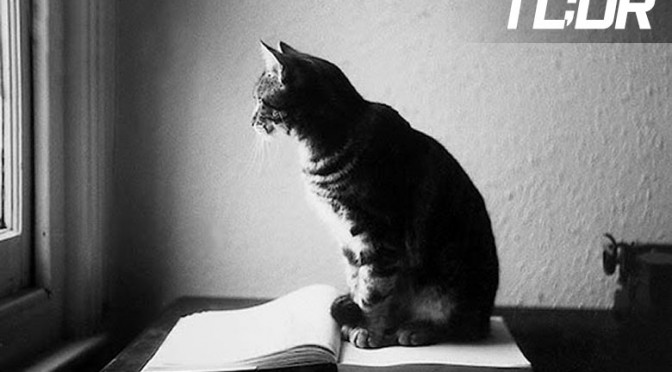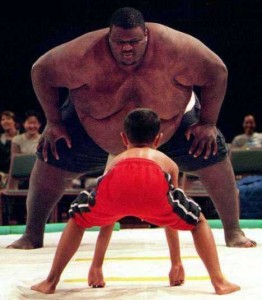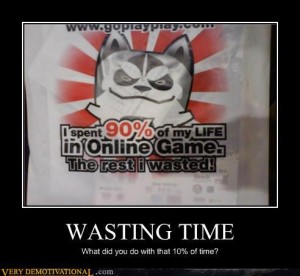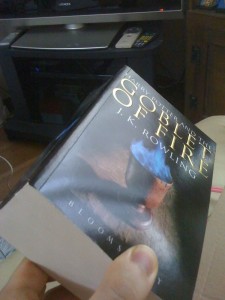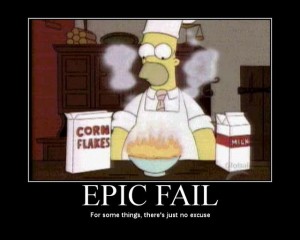Let’s face it, it’s impossible to escape the fact that we live in a world where “too long; didn’t read” is, itself, too long to be bothered with. The audacity of being so lazy you have to reduce an incomplete sentence into just letters can leave the mind boggling. In the next few years there’s little doubt we’ll be seeing the semi-colon go bye bye too. And, yes, my lack of faith in the internet’s tolerance of the English language is that strong. And I’m a novelist.
So, clearly, I’m also fucked.
And that’s actually the consensus from the industry, more or less. You look around long enough for writing advice and you’ll inevitably come to one piece of advice that always pops up: Keep it short – the smaller, the better.
I’m not just talking about being “concise”, I mean length, overall. The thing that writers and publishers have the least confidence in is the reader’s attention span. It’s easy to mistake the fact someone prefers television to prose as a sign their brains just can’t stay focused very long. It’s also easy to mistake people spending time on the internet as a sign they can’t focus on just one thing at a time anymore. Hell, there’s been studies about this.
But I know for a fact that I’ve seen the opposite is true. I’ve watched people, myself included, go to Wikipedia to look up a single fact and come back 3 hours later wondering how they (or myself) ended up researching every facet of something they had no intention of looking up in the first place. You’ve probably done it too. And it’s not just Wikipedia and people with normal attention spans. I’ve actually watched a man with ADHD spend hours on random image websites, even long after it stopped giving him new material. So, if someone like that can have that kind of laser focus, that leaves us with an uncomfortable truth. In the end, it’s about whether or not your material was considered “worth the time”.
Many people worry about what their page counts are going to be. For publishers it makes sense because you have to deal with the costs of printing the thing. For writers, editors, agents and all of the rest? They believe, usually emphatically, that people just will not read a long manuscript or novel. It’s actually so ingrained into people that even your eBooks apparently need to be shorter too despite the complete lack of overhead. It’s usually included in the tips for making your book successful in any format. Yet, looking back over the last decade, I notice a trend in the big hits that do not agree with this at all.
Most major hits in the last ten to fifteen years have been longer than the average length of their competition. Harry Potter started out at average length with Philosopher’s Stone clocking in at 76,944 words, which for a children’s book was still actually long, but for a novel in general it’s about average. But you know what happened? They became longer. By the time the series reached Order of the Phoenix the word count was coming in at 257,045 words. To give you an idea of scope for that: Crime and Punishment comes in at 211,591 words. A children’s book is longer than Crime and Punishment. In fact, the standard, last I checked, was for an average of 250 words to be printed per page on an average novel. Do the math.
If anyone submitted that manuscript cold, it would have been rejected before it even passed the slush pile. You’re always told to write shorter works and trim things down for the sake of brevity. And the thing everyone always says is that you just can’t maintain someone’s attention for that long. But, I’m sorry, Rowling’s thousand page book would like to disagree with you. And the honest truth, the harsh truth, is that if they put your book down due to length – you fucked up.
Everything you write is going to be judged on how long you can hold someone’s interest, not how many words actually hit the page. If your book is “too long”, it wasn’t actually because of the length, it was because somewhere along the line you wrote too many parts that just weren’t worth being there. I recently had a conversation with someone about how they felt a movie was too long. When I looked up the time I found that it was almost a full hour shorter than a couple of films he watched repeatedly. Was it because the film was really too long, or just because it didn’t hold his interest?
I think the answer is obvious.
So, for those of you out there who stress about word counts, wonder if the book is too long and concern yourself with the length more than the content – stop it, you’re ruining your book. I tell everyone something I heard from several of the better writers of our time: write it until it’s finished then worry about length when you edit.
And don’t feel too bad about having to cut out some parts of the manuscript when you get to that point. You’re catching it before it becomes a problem. So be glad you have the opportunity to stop yourself rambling in text. You really wouldn’t have that ability any other time.
And, come to think of it, “tldr” is probably the lesser of evils.
And for those of you wondering if I put my money where my mouth is, check out my book, behold its word count and know that at least one person told me to shave off 20,000 words because “that’s what sells”. I also went onto ignore that person for the second one.


